Overview
This article presents ten exemplary progressive web apps (PWAs) that significantly elevate user engagement across diverse industries. These applications enhance customer interactions through features such as offline access, rapid loading times, and personalized experiences. For instance, companies like Starbucks and Netflix illustrate the effectiveness of PWAs in increasing user satisfaction and retention.
Research indicates that organizations leveraging PWAs report substantial gains in engagement metrics, underscoring the transformative potential of this technology within modern digital strategies.
Brand managers must recognize the imperative of integrating PWAs into their digital frameworks to harness these benefits.
Introduction
Progressive Web Apps (PWAs) are revolutionizing the digital landscape, providing users with seamless experiences that integrate the strengths of both mobile and web applications. As businesses strive to enhance user engagement and satisfaction, the adoption of PWAs has emerged as a transformative strategy, with industry leaders such as Starbucks, Tinder, and Netflix at the forefront. Yet, the pressing question persists: how can brands fully leverage the potential of PWAs to not only attract but also retain their audience in an increasingly competitive market?
This article delves into ten compelling examples of progressive web apps that are significantly driving user interaction and engagement, offering invaluable insights for businesses eager to refine their digital strategies.
Magic Playbox: Transforming Brand Engagement with Immersive AR Solutions
Magic Playbox has revolutionized brand interaction with its cutting-edge AR solutions, crafting interactive activities that seamlessly merge the physical and digital realms. With a portfolio exceeding 100 high-quality AR applications, the studio exemplifies how immersive technology captivates audiences and elevates storytelling.
Notably, brands that leverage AR report significant improvements in customer interactions, with immersive activities increasing participation levels by up to 200% compared to traditional methods. For example:
- IKEA's AR app has led to an 86% increase in engagement.
- Sephora's Virtual Artist app has boosted purchase rates by 31%.
These successful initiatives reinforce Magic Playbox's status as a frontrunner in the XR development arena, highlighting the substantial impact of AR on brand loyalty and customer satisfaction.
E-commerce brand managers should consider integrating AR into their marketing strategies by:
- Exploring user-friendly AR tools.
- Collaborating with AR developers.
- Assessing customer feedback to create tailored interactions that resonate with their audience.
Starbucks: Enhancing Customer Experience with a Progressive Web App
Starbucks has expertly rolled out one of the notable progressive web app examples that empowers customers to browse the menu, customize orders, and add items to their cart, even in the absence of a stable internet connection. This offline capability, combined with rapid loading speeds, significantly enhances customer interaction. It facilitates engagement with the brand at any time and from any location, demonstrating a commitment to meeting customer needs effectively.
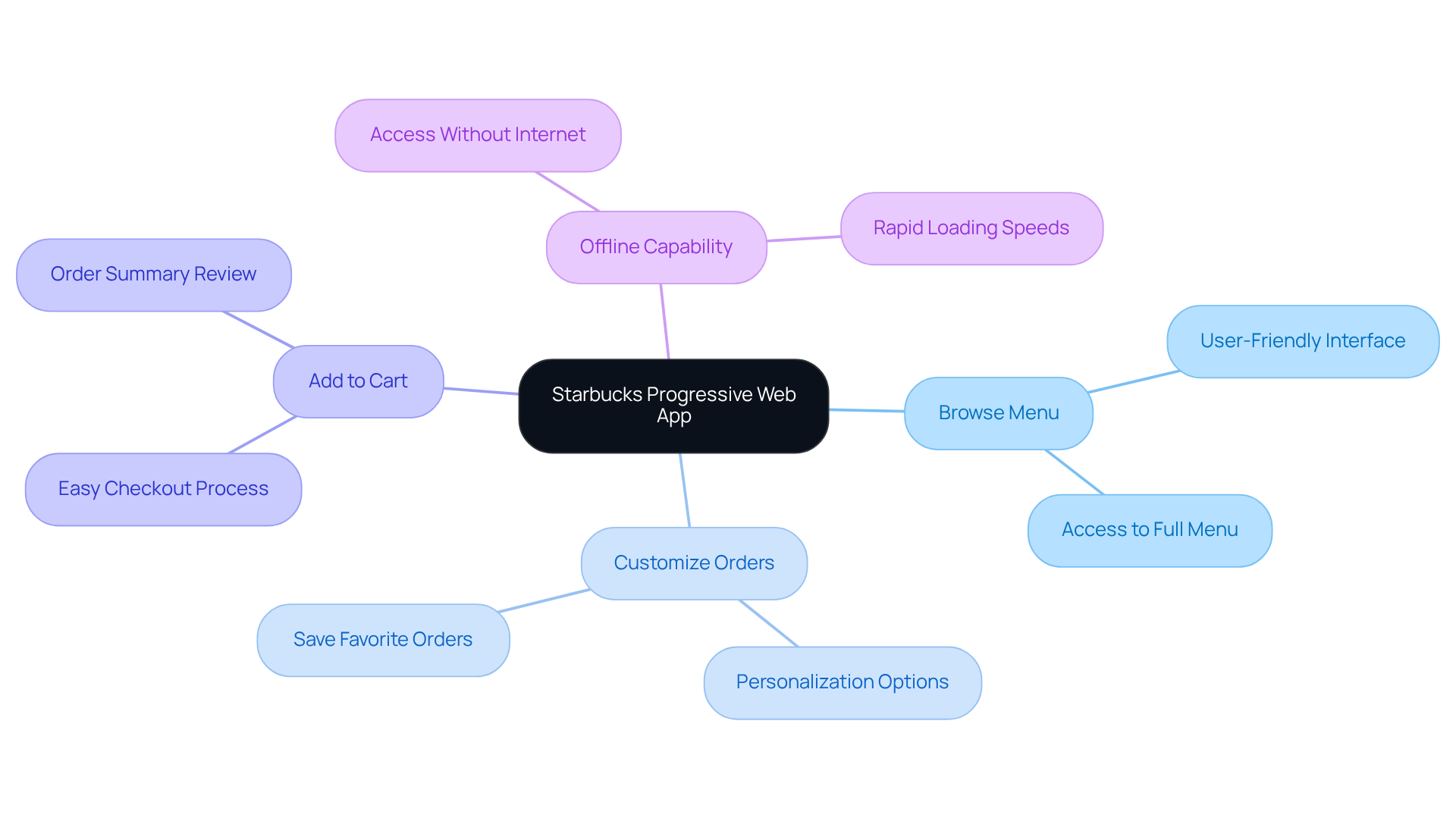
Tinder: Boosting User Interaction Through a Progressive Web App
Tinder's Progressive Web App (PWA) has revolutionized user interaction by delivering a seamless experience that facilitates effortless swiping and messaging. With over 75 million monthly active users, including 7.8 million in the US, its lightweight design significantly enhances load times, even on slower networks, achieving an impressive 61% improvement in speed—an essential factor for sustaining user engagement.
This swift performance has led to increased satisfaction among users, with active participants logging in an average of four times daily, as noted by Bernard Kim, CEO of Match Group. By effectively blending accessibility with functionality, Tinder's PWA stands out among the leading progressive web app examples that demonstrate how a well-executed PWA can elevate user experiences in the fast-paced mobile application landscape.
The strategic focus on lightweight design not only simplifies interactions but also fosters a more engaging environment, ultimately driving higher retention rates and loyalty. Furthermore, the broader implications of PWAs are evident, as they can boost sales by up to 36%, underscoring their potential impact on engagement and retention.
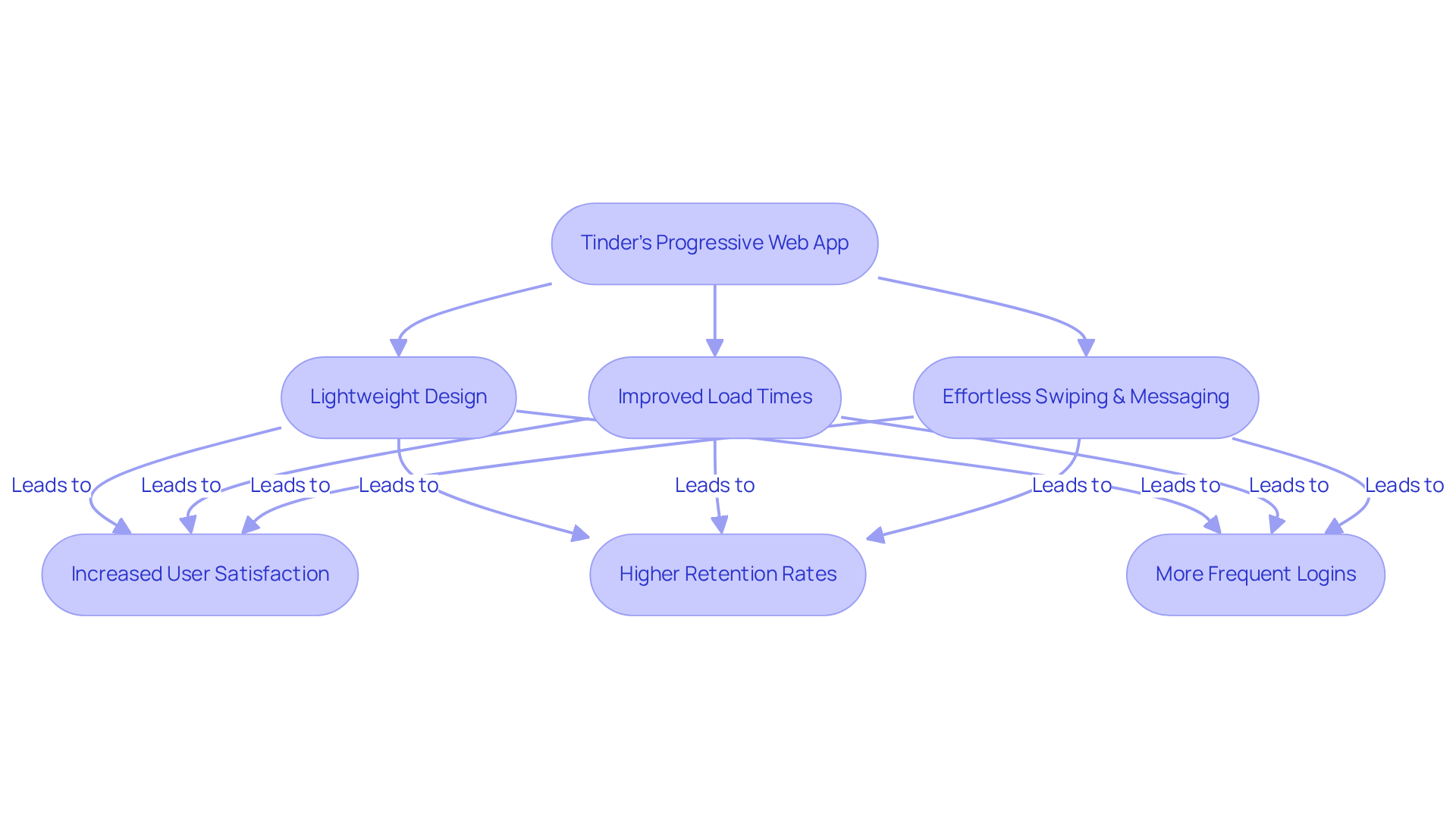
MakeMyTrip: Streamlining Travel Bookings with a Progressive Web App
MakeMyTrip has successfully introduced a Progressive Web App (PWA), which is one of the notable progressive web app examples that significantly enhances the travel booking experience, enabling users to effortlessly search for flights, hotels, and other travel services.
With loading times often under two seconds and robust offline capabilities, the PWA has markedly improved overall customer satisfaction.
This seamless interaction, characterized by lower bounce rates and quicker access to services, has resulted in a substantial increase in conversion rates—an impressive threefold advantage for the travel industry utilizing PWAs.
Furthermore, companies within this sector have reported up to a 70% boost in customer engagement after adopting similar technologies.
By optimizing the booking process, MakeMyTrip showcases progressive web app examples that can transform the travel landscape, simplifying journey planning while fostering greater satisfaction and loyalty.
As a MakeMyTrip executive remarked, 'Our PWA strategy has transformed the manner in which our customers engage with our services, ensuring a more engaging and efficient booking process.
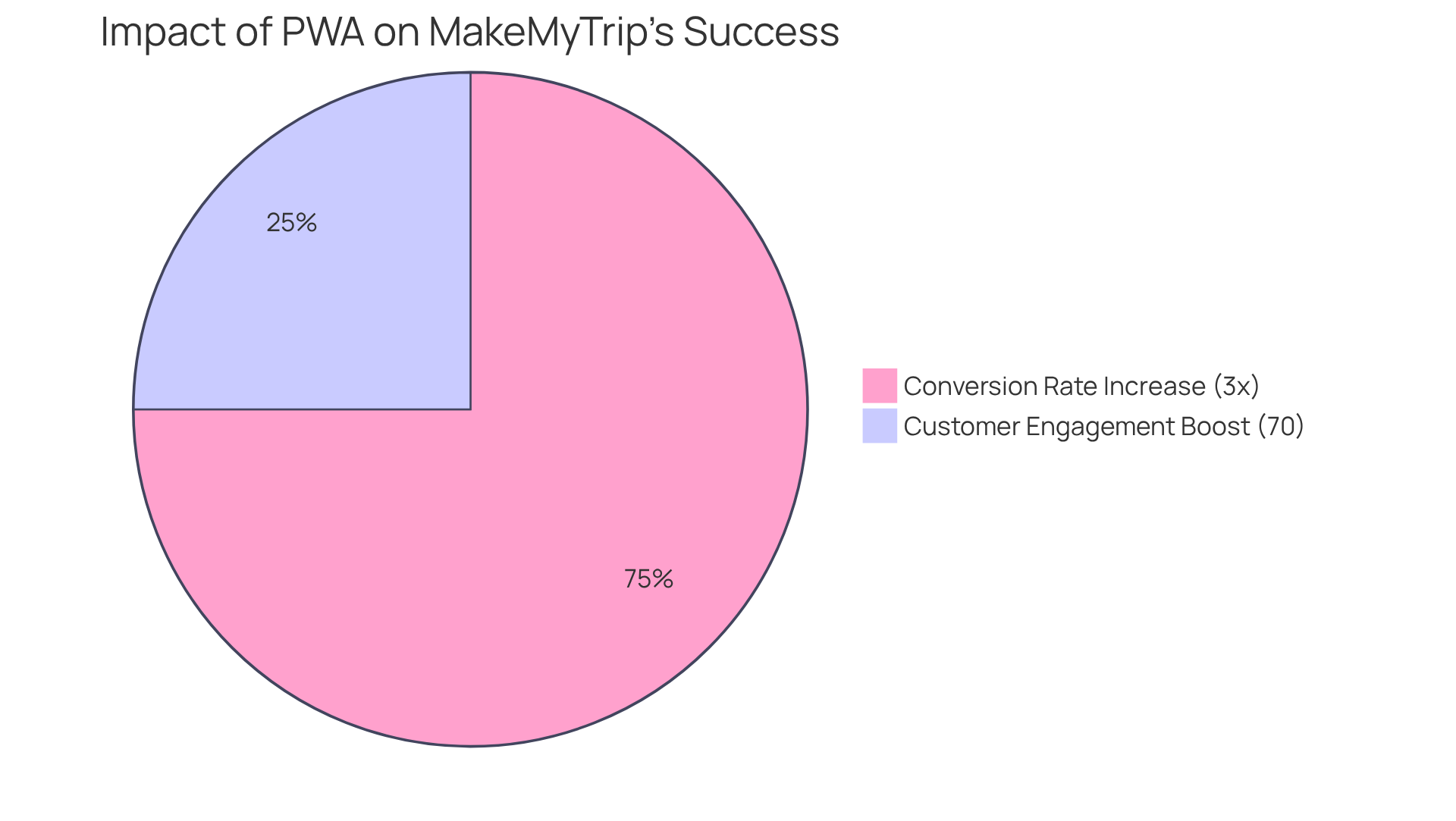
Pinterest: Engaging Users with a Seamless Progressive Web App Experience
Pinterest's PWA has revolutionized user interaction by delivering a swift and responsive experience that fosters exploration and engagement. The ability to access content offline empowers users to discover and save ideas without the need for a constant internet connection. This functionality, paired with strategic push notifications, has led to an impressive increase in retention and time spent on the platform.
Notably, Pinterest reported a:
- 40% rise in time spent on the site
- 50% increase in ad click-throughs following the PWA implementation
Furthermore, Pinterest successfully reduced its data loading size from 650KB to 150KB, significantly enhancing performance. Previously, Pinterest's online presence converted only 1% of visitors, underscoring the critical need for this transition.
These advancements underscore the pivotal role of progressive web app examples in enhancing social media interactions, making them essential tools for brands aiming to boost audience engagement. As a Pinterest team member aptly stated, 'The PWA has enabled us to maintain engagement and connectivity, even when they are offline.
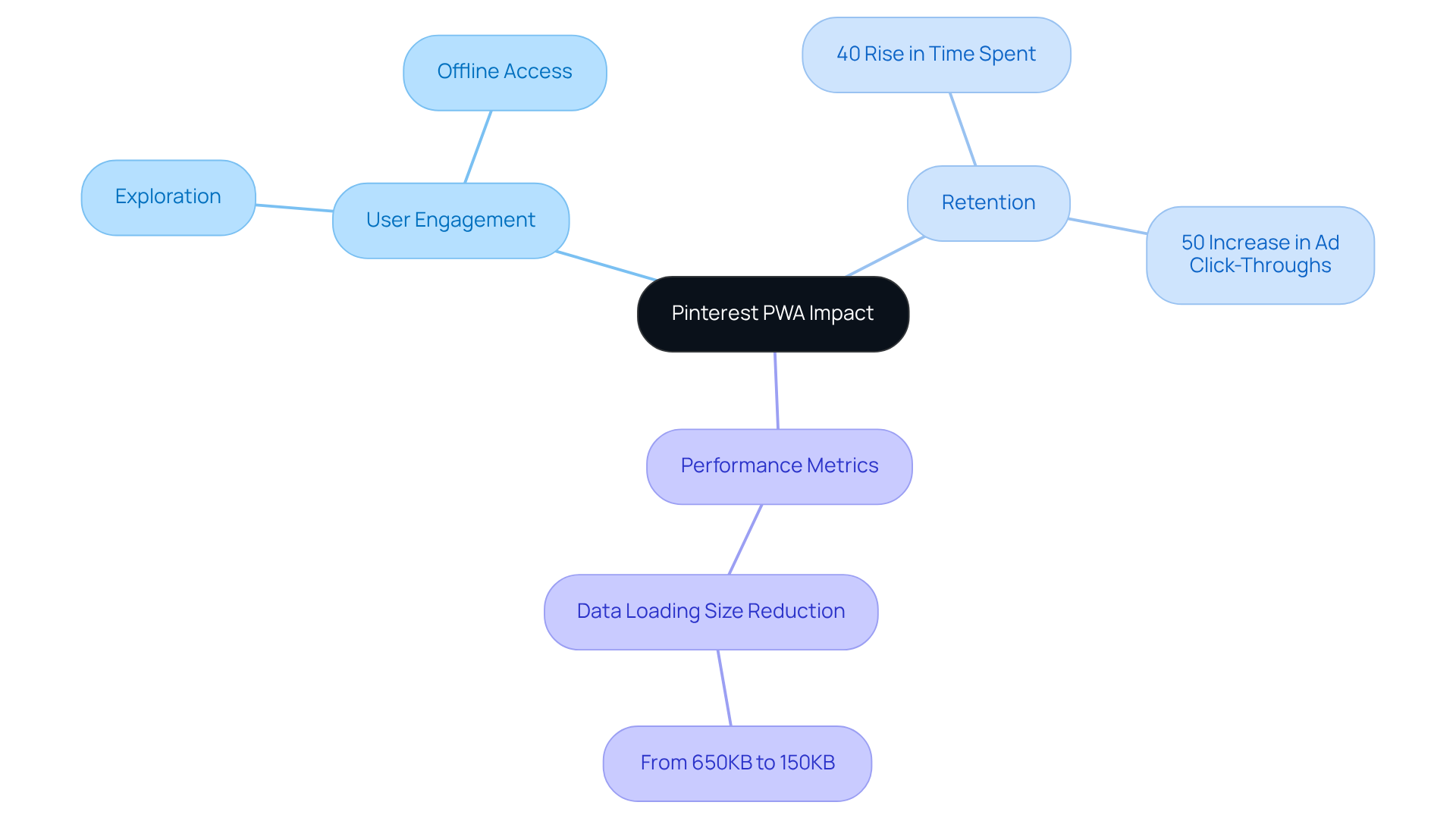
Yummly: Personalizing Cooking Experiences with a Progressive Web App
Yummly's Progressive Web App (PWA) revolutionizes the cooking experience by delivering personalized recipe recommendations tailored to individual preferences, dietary restrictions, and cooking skills. This level of personalization not only enhances user interaction but also fosters culinary exploration.
Research indicates that apps utilizing personalized messaging experience a 6% increase in 30-day retention rates, underscoring the effectiveness of Yummly's approach. Furthermore, the app's offline features empower users to access their saved recipes anytime, ensuring that culinary inspiration is always at their fingertips, even without an internet connection.
As Esat, a Senior Product Marketing Manager, asserts, "Personalization isn't just a trend; it's a fundamental shift in how successful businesses connect with their customers." This innovative strategy illustrates the considerable influence of progressive web app examples in the food sector, where customer involvement is paramount.
By leveraging the strengths of a PWA, Yummly provides progressive web app examples that effectively transform how individuals engage with cooking, making it more accessible and enjoyable. E-commerce brand managers should seriously consider implementing similar PWA features to enhance engagement and drive customer loyalty.
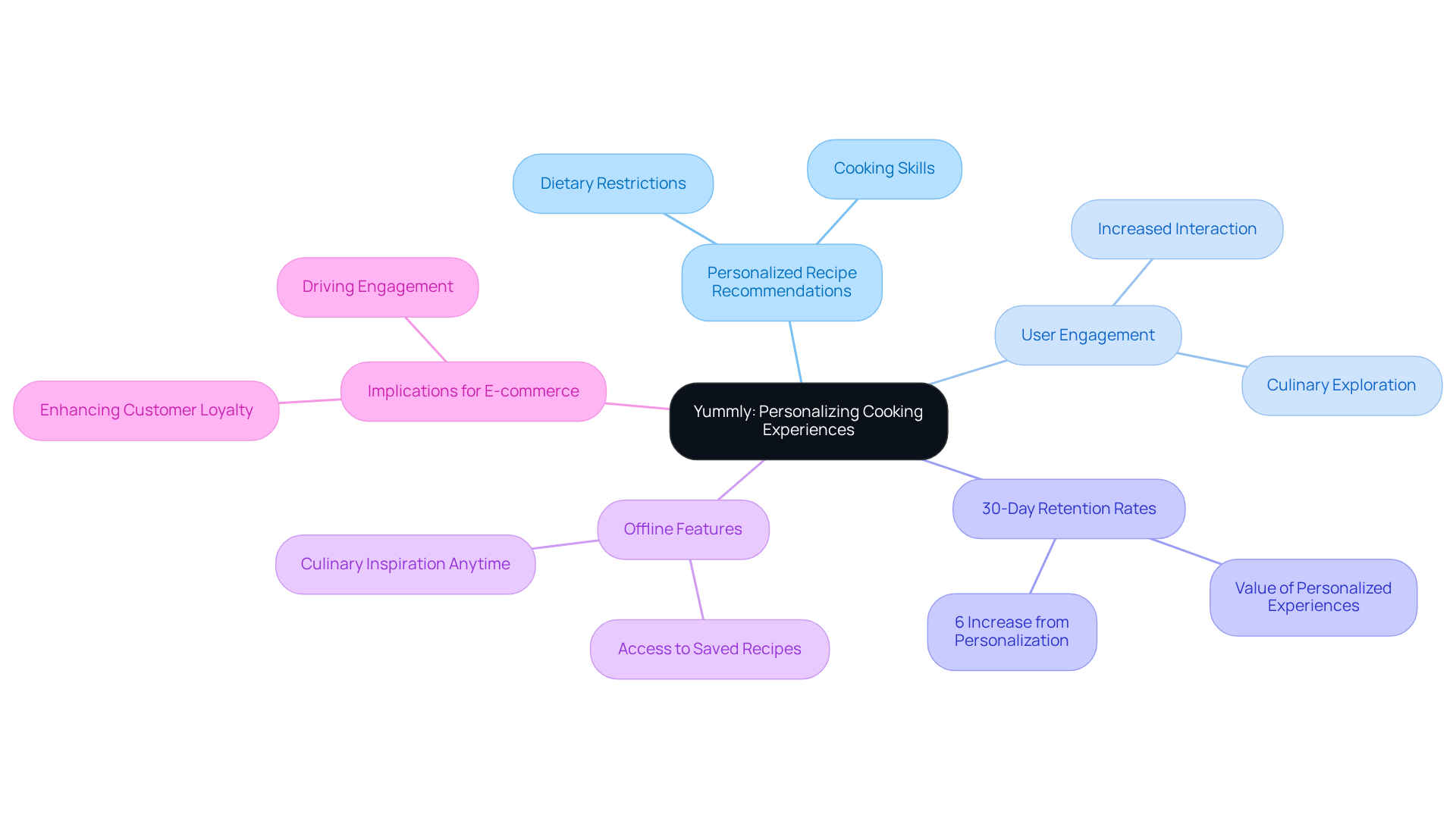
Uber: Improving Accessibility with a Progressive Web App for Low-Bandwidth Areas
Uber's Progressive Web App (PWA) is expertly engineered to operate efficiently in low-bandwidth environments, allowing users to book rides swiftly and effortlessly. This lightweight application is meticulously optimized for rapid loading, even on slower networks, ensuring uninterrupted access to essential services. By prioritizing accessibility, Uber's PWA significantly elevates the rider experience, enabling seamless navigation of the app regardless of internet connection quality.
Notably, since the launch of m-uber, desktop users have accounted for 30% of overall access, underscoring the PWA's impact on user interaction. As Madhur Chadha, Senior Product Manager at Uber, asserts, 'The PWA enables individuals to book rides swiftly, even on 2G networks, without requiring the installation of the native app.'
This innovative approach not only streamlines the ride-booking process but also exemplifies progressive web app examples that can enhance overall engagement in the ride-sharing sector, inviting collaboration to further leverage these advancements.
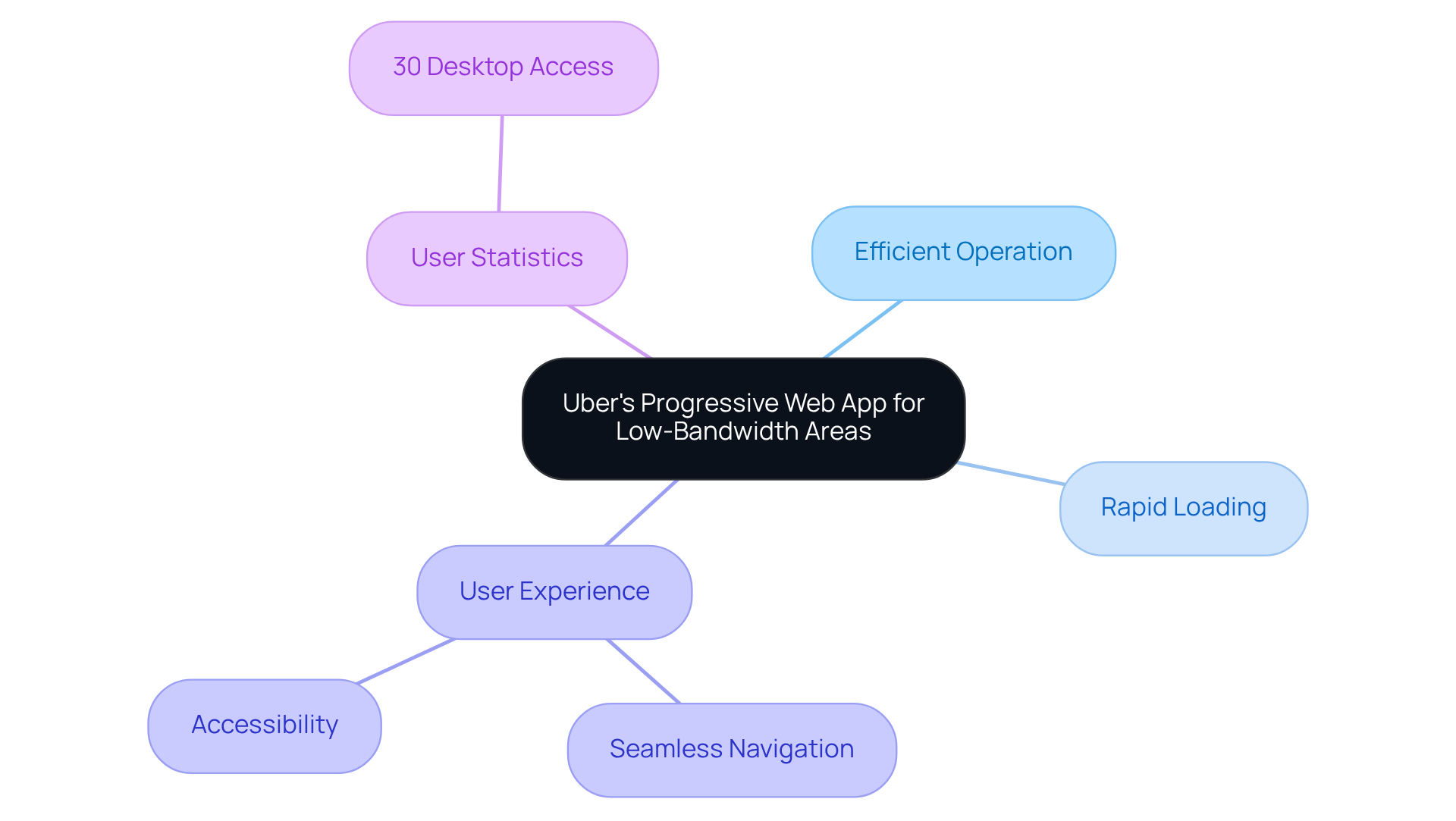
Flipkart: Revolutionizing Online Shopping with a Progressive Web App
Flipkart has transformed the online shopping landscape by implementing a Progressive Web App (PWA), which effectively merges the strengths of both mobile and web applications. This PWA is designed for optimal performance, featuring rapid loading times and offline access, allowing users to interact with saved content even without an internet connection. Furthermore, the integration of push notifications ensures that customers remain engaged and informed about new offers and updates.
The results are compelling: Flipkart has reported an impressive 70% increase in conversion rates since the launch of its PWA. This substantial boost in consumer engagement not only enhances customer satisfaction but also sets a new benchmark for e-commerce platforms striving to elevate their digital interfaces. As the market for progressive web app examples continues to expand, with projections indicating a compound annual growth rate of 30.5% from 2024 to 2030, Flipkart's forward-thinking strategy showcases how these examples can help companies leverage technology to create engaging shopping experiences that drive sales and foster customer loyalty.
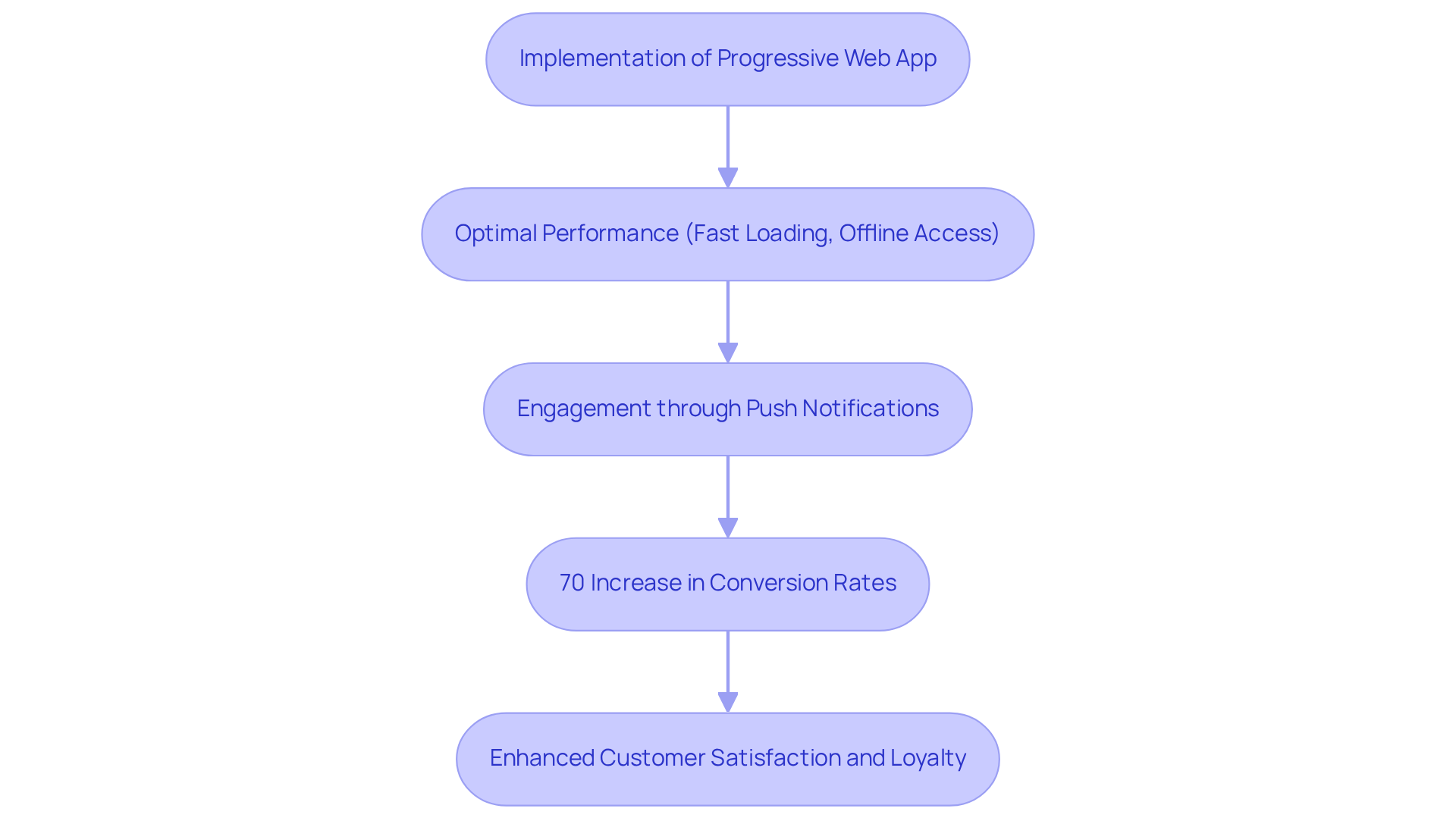
Spotify: Enhancing Music Access with a Progressive Web App
Spotify's Progressive Web App (PWA) revolutionizes the music streaming landscape by allowing users to access their favorite tracks and playlists seamlessly, without the need for a native application. This innovative approach leverages rapid loading times, significantly enhancing customer satisfaction and engagement.
Research indicates that a responsive site can boost conversions and lower bounce rates, with Spotify's PWA serving as one of the leading progressive web app examples for optimizing digital music access. The intuitive interface further streamlines navigation, ensuring that listeners can enjoy their music effortlessly across multiple devices.
By integrating these features, Spotify exemplifies the transformative potential of progressive web app examples in the digital music sector, setting a benchmark for accessibility and engagement. To elevate their platforms, e-commerce brand managers should draw inspiration from progressive web app examples such as those implemented by companies like Starbucks and Alibaba, which have demonstrated increased engagement and conversions through their innovative strategies.
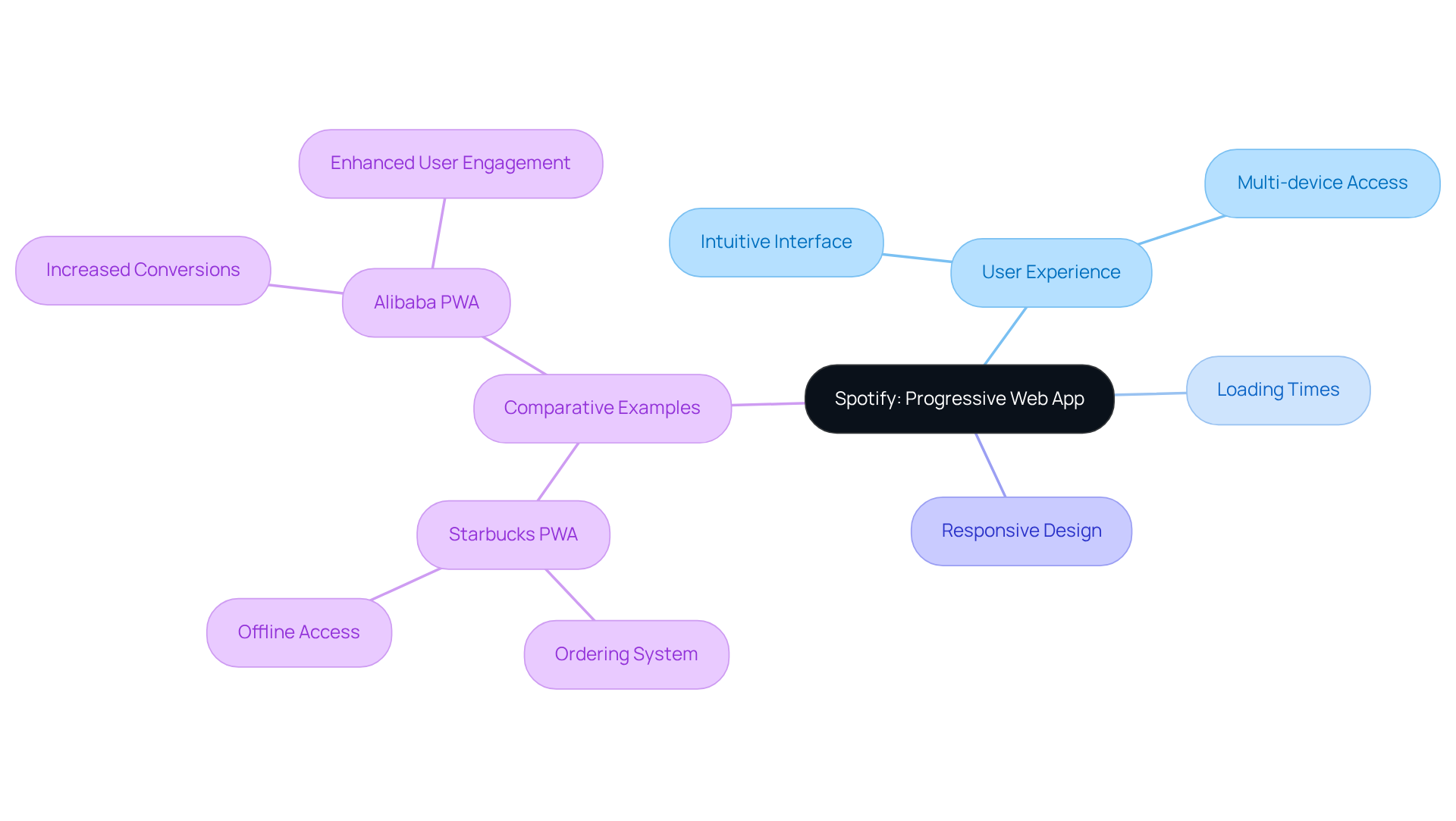
Netflix: Engaging Viewers with a Progressive Web App Experience
Examples of progressive web apps, like Netflix's, revolutionize the streaming experience by providing seamless content access, including offline viewing options that empower users to download and enjoy their favorite shows without an internet connection. This feature significantly impacts retention rates, particularly for individuals facing connectivity challenges.
As Ted Sarandos, Netflix's Chief Content Officer, asserts, the app's design emphasizes rapid loading times and a smooth interface—crucial elements in a competitive landscape where viewer attention is fleeting. Additionally, personalized suggestions enhance engagement by curating content tailored to individual preferences, facilitating the discovery of new shows and films.
This strategic implementation of PWA technology, highlighted by several progressive web app examples, not only elevates viewer satisfaction but also fortifies Netflix's position as a leader in the streaming industry. For e-commerce brand managers, the insights derived from Netflix's PWA can be leveraged to enhance user engagement on their platforms, particularly through features that prioritize user experience and retention.
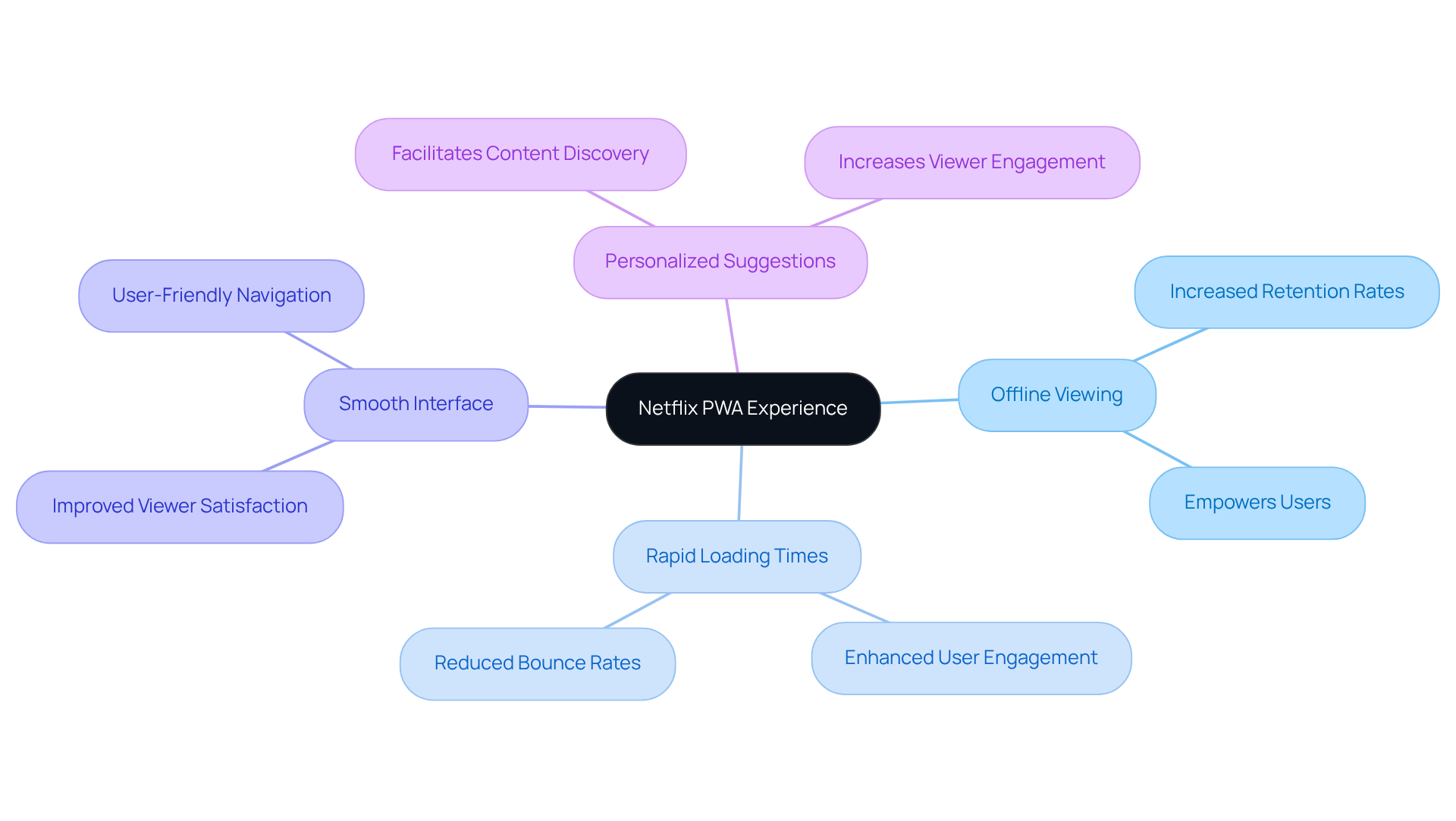
Conclusion
The exploration of progressive web apps (PWAs) underscores their transformative potential in elevating user engagement across diverse industries. By seamlessly merging advanced technology with user-centric design, brands can significantly enhance interactions, boost retention rates, and cultivate loyalty among their customer base.
Throughout this discussion, notable examples such as:
- Magic Playbox's immersive AR solutions
- Starbucks' offline capabilities
- Tinder's rapid loading features
illustrate how PWAs can forge more engaging and accessible experiences. Additional noteworthy mentions include:
- MakeMyTrip's streamlined travel bookings
- Pinterest's content accessibility
- Spotify's user-friendly music access
All highlighting the pivotal role that PWAs play in contemporary digital interactions.
As businesses navigate the evolving digital landscape, embracing the advantages of progressive web apps becomes imperative. By prioritizing user experience through innovative technology, brands not only elevate customer satisfaction but also strategically position themselves for sustained growth in a competitive marketplace. The insights derived from these examples serve as a compelling reminder that investing in user engagement strategies through PWAs can yield remarkable outcomes, setting the stage for future success.
Frequently Asked Questions
What is Magic Playbox and what does it offer?
Magic Playbox is a studio that specializes in immersive augmented reality (AR) solutions, creating interactive activities that blend the physical and digital worlds. They have a portfolio of over 100 high-quality AR applications.
How does Magic Playbox's AR technology impact brand engagement?
Brands using Magic Playbox's AR solutions report significant improvements in customer interactions, with immersive activities increasing participation levels by up to 200% compared to traditional methods.
Can you provide examples of brands that have successfully used AR?
Yes, IKEA's AR app has led to an 86% increase in engagement, while Sephora's Virtual Artist app has boosted purchase rates by 31%.
What strategies should e-commerce brand managers consider for integrating AR?
E-commerce brand managers should explore user-friendly AR tools, collaborate with AR developers, and assess customer feedback to create tailored interactions that resonate with their audience.
What features does Starbucks' progressive web app (PWA) offer?
Starbucks' PWA allows customers to browse the menu, customize orders, and add items to their cart, even without a stable internet connection, enhancing customer interaction and accessibility.
How does the Starbucks PWA improve customer experience?
The offline capability and rapid loading speeds of the Starbucks PWA significantly enhance customer engagement, enabling users to interact with the brand anytime and anywhere.
What is the significance of Tinder's progressive web app?
Tinder's PWA revolutionizes user interaction by providing a seamless experience for swiping and messaging, achieving a 61% improvement in load times, which is crucial for user engagement.
What are the user engagement statistics for Tinder's PWA?
Tinder has over 75 million monthly active users, with active participants logging in an average of four times daily, indicating high user satisfaction.
How do progressive web apps (PWAs) benefit businesses?
PWAs, like those used by Tinder, can boost sales by up to 36%, highlighting their potential to enhance user engagement and retention rates.




